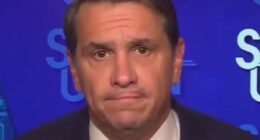Share this @internewscast.com
Joe Marler rummages through his study, searching for his Santa outfit. “It’s a top-notch costume,” he boasts, slipping into a large red coat.
His wife, Daisy, looks on with a knowing smile. “He’s had that since the kids were little,” she remarks.
With his bushy beard, Marler is perfectly suited for his yearly role as Santa Claus at their children’s school.
Since our last chat, much has changed. Marler has become a household name thanks to his appearance on The Celebrity Traitors. But does he still keep in touch with Jonathan Ross? We’ll delve into that soon.
The discussion veers unexpectedly when Marler mentions his admiration for Paul Simon, who has just announced a 2026 European tour, including stops at the Royal Albert Hall and London Palladium. “Maybe my wife will catch wind of this and surprise me with tickets for Christmas,” he hints, speaking a bit louder.

Joe Marler has shot to celebrity fame following his starring role on The Celebrity Traitors

Marler was banished in the final after the fellow Faithfuls fell for Alan Carr’s trickery

Marler has become a national treasure as a result, appearing on the likes of Loose Women and Saturday Kitchen
What else is on his holiday wish list? “I don’t usually ask for anything, and I rarely get anything,” he admits. “I’m more of a giver—and sometimes I share too much. My main wish is for the kids’ happiness. Honestly, I’m not too fussed about gifts; it’s the family time that counts.”
‘Things have been so mental the last couple of months that I’ve not really been here. I’ve actually been away more than I ever was with rugby. It’ll be nice to just sit back and play loads of games.
‘We’ve got this game where you put a banana between your legs and you have to squat down and pick up hoops. I love a bit of Scrabble, but it descends into chaos with the kids because they just make up words. Rather than trying to enforce the rules on them, they’ll just be like “phlepholmphla” and that’s 120 points.’
I last saw Marler back in June, at a padel competition. The Traitors series had already been filmed in Scotland but he had no idea how it would be received. He spoke about the uncertainty that followed his retirement from rugby, still finding his way through life as he sought a new way of making a living as a man in his 30s.
‘It’s been a wild year,’ he says. ‘Very up and down. After I retired last year there was a three or four month honeymoon period that felt like an extended off season. We went to Lapland with the kids. Then it dawned on me: “Hang on a minute, what do I do now? Who am I? What’s my purpose? How am I going to earn money for the next 40 years?”
‘I knew I had The Traitors coming up because we recorded it back in May. It was a bit of fun, but I didn’t envisage what would come off the back of it. I was still a bit lost. I reached out to a couple of team-mates and they said, “Mate, that’s completely normal”. I thought I had it covered but it hit me like a ton of bricks. Missing the schedule, the day-to-day, the goal setting.
‘I spent a few months floating about, a little bit lost with it all. Me and Daisy had only really known our lives together when I was away for half the year. As hard as it was for her with the four kids, we made it work. Suddenly I’m home all the time and it’s, “Where do I fit then? I’m in the way”. Then, when The Traitors came out, everything went nuts. I didn’t know it was going to be that big.’
Marler, a gameshow Faithful, was (spoiler alert) killed off in the final round by Nick Mohammed, who fell for the wiles of Alan Carr, but he had already been crowned the people’s champion. The non-rugby audience fell in love with his humour and mannerisms and he was being booked up before the final had even aired. Loose Women, Saturday Kitchen, VIP events.

Marler was the people’s champion during the series – the non-rugby audience fell in love with his humour and mannerisms

‘When The Traitors came out, everything went nuts. I didn’t know it was going to be that big.’
‘Things just exploded,’ he says. ‘“Do you want to come on this? Do you want to come on that? Do you want to do Gogglebox?” All these amazing things I’d watched as a fan. I was like, “Oh my God, yes, yes, yes, yes, yes”.
‘I was saying yes to everything at the fear of not getting the opportunity again but I then found it really hard to enjoy because it was so full on. In eight weeks I think I had three days off. I was sort of like, “What’s going on?”. It’s been really exciting, really fun, but also mega exhausting.’
Marler’s knockabout character is a marketeer’s dream. It has propelled him into a world where he is rubbing shoulders with the national treasures he used to watch on the television. A world away from the days of sticking his head into a scrum for a living.
‘There have been moments where I’m sitting there thinking, “Oh right, I’m handing Sir Lenny Henry a drink and having a chinwag with him”,’ he says. ‘I used to watch him on Comic Relief growing up and now I’m sat next to him on a couch thinking, “What is going on?”. It’s bonkers.
‘The WhatsApp group from The Traitors is surreal. It’s constantly pinging, different things firing off. Stephen Fry is like: “Hello my darlings, how are you all?” I thought it would just dry up after we finished filming in May. Everyone’s got busy lives, they’ll just crack on. What’s surprised me is how the big dogs, people like Stephen and Jonathan Ross, have also been blown away by how big The Traitors was. I’m thinking, “Hang on, you’ve been in the business for years”, yet even they were surprised.
‘We went out for a Christmas lunch the other day to catch up on it all. We went to some posh restaurant in Mayfair. Jonathan set it up with all his connections. I said: “I’d love to come, is it OK if I wear shorts?” Fortunately, I wore shorts and I got in.
‘Alan Carr turned around and said, “Mate, when are they going to stop asking us about The Traitors?”. I said, “Mate, it’s all I’ve got now! I’m not the rugby player, I’m the big fat hairy guy that was on The Traitors!”. People have forgot that I played rugby. I was like, “I need it a little bit longer Alan!”.’
The series has propelled Marler into a pool of instant success. His life changed overnight with quickfire projects but what about the longer-term future?

The series has propelled Marler into a pool of instant success. His life changed overnight with quickfire projects

Marler’s knockabout character is a marketeer’s dream. It has taken him into a world where he is rubbing shoulders with the national treasures he used to watch on the television

Marler joined his Traitors colleague Nick Mohammed on the Celebrity Gogglebox sofa
‘It’s been so bonkers that I’ve just been concentrating on getting to Christmas so I can just stop and do nothing – enjoy the food and drink,’ says Marler. ‘I’ll get the Taste the Difference Wagyu beef burgers from Sainsbury’s and I’ll tell everyone they’re homemade. Just be with the family and have some time to breathe.
‘I’ve said yes to everything and that’s helped me work out what I do and don’t like doing. Now I can head into January thinking, “OK, I’d quite like to explore this stuff”. As well as keeping my toe in rugby…’
Marler still holds the title of welfare officer for the England rugby team.
‘I keep my ear to the ground and check in with the England team,’ he says. ‘I was in camp during the autumn, making sure they’re getting their appropriate rest, especially the Lions boys. They’re getting the rest that is available to them in the current agreement.
‘I would argue they need more and that is a constant battle because I also understand it from Premiership Rugby’s point of view. The game is dying on its a*** financially. We’re trying everything we can to push it to the masses and to do that you need your stars available as much as possible.
‘It’s tough enough selling tickets with all the big names. I understand it. Everyone needs to sit in a room together and look at the season structure moving forwards. Do you want these big-name players to have long careers? Or do you want to overplay them, tear the a*** out of them and then they’re injured. They’re gone. Like a Sam Warburton who has retired too early.’
Is he watching many games these days? ‘Not really, no,’ he says. ‘Saying that, I probably watch more than I did when I was playing. I flick it on to see how the England boys are getting on. I’ll always have a soft spot in my heart for Harlequins and what they gave me, but part of the reason I retired was because the club were going in a different direction that I didn’t necessarily agree with. Their playing style.
‘Lo and behold, Danny Wilson left. I didn’t want to say “I told you so” but… the club is bigger than any player or coach. The club has always branded itself as the entertainers, so do that.’

‘I probably watch more rugby than I did when I was playing. I flick it on to see how the England boys are getting on’

‘We went out for a Christmas lunch the other day to catch up on it all. We went to some posh restaurant in Mayfair. Jonathan (Ross, right) set it up with all his connections’

‘It’s been so bonkers that I’ve just been concentrating on getting to Christmas so I can just stop and do nothing – enjoy the food and drink’
Would he like to see an active player appear on The Traitors? The sport would certainly benefit from a player taking part on the show before they retire?
‘Definitely,’ he says. ‘It has to fit in the club and England schedules but the game definitely needs to be more open to it and be less worried about it being so distracting. People say that players shouldn’t be able to go and do this and that if it isn’t rugby focused. Well, yes they should, because that’s where they’ll reach audiences that don’t know rugby.
‘If you got Henry Pollock on The Traitors, he would be away for two weeks and they’d go “Who is this lad?” in the same way, no one knew who I was. I was a retired rugby player so it’s not really catching the rugby audience. I’m just the big fat hairy guy. If it was Henry Pollock or a current player who got an opportunity to do something like that, people might follow him back into rugby. You’ve got to try these things.’
What about his own plans for 2026? ‘I’d absolutely love to get something off the ground with Joe Wilkinson,’ he says. ‘Some sort of travel, round-the-world experience. Do a bit more TV with him. Mainly because I just find him so funny to be around.
‘Ultimately, it’s the same as it was in rugby. I’ll go in the direction of what pays the bills the best. It’s about trying to feed the four little mouths I’ve got and the two big mouths me and Daisy have got. And the turtle, and the three dogs, the rabbit, the father-in-law, the mother-in-law. Got any gigs going?’
Joe Marler has teamed up with Sainsbury’s to launch ‘Couch to Christmas Day’; a three part audio guide on how to navigate festive hosting like a pro. The audio guide is live on Spotify and Apple Music now.













